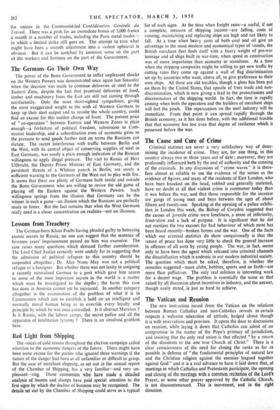The Cause and Cure of Crime
Criminal statistics are never a very satisfactory way of deter- mining the incidence of crime. They are, for one thing, in this country always two or three years out of date ; moreover, they are profoundly influenced both by the zeal of authority and the cunning of the criminals. In any discussion of "crime waves" it is there- fore almost as reliable to use the evidence of the senses as the evidence of figures, and many of the residents of East London, who have been knocked on the head, robbed and generally molested, have no doubt at all that violent crime is commoner today than it was before the war, and that those responsible for the increase are gangs of young men and boys between the ages of about fifteen and twenty-one. Speaking at the opening of a police exhibi- tion in London this week, the Bishop of Croydon suggested that the causes of juvenile crime were loneliness, a sense of inferiority, frustration and a lack of purpose. It is significant that he did not mention the two excuses for bad behaviour of Which most has been heard recently—broken homes and the war. One of the facts which our criminal statistics do show unequivocally is that the return of peace has done very little to check the general increase in offences of all sorts by young people. The war, in fact, seems only to have been the agent which released into criminal channels the dissatisfaction which is endemic in our modern industrial society. The question which must be asked, therefore, is whether the remedies suggested—more clubs, hobbies, sports and so forth—are more than palliatives. The only real solution is interesting work for a decent wage. The problem is essentially the same as that raised by all discussion about incentives in industry, and the answer, though easily stated, is just as hard to achieve.


































 Previous page
Previous page